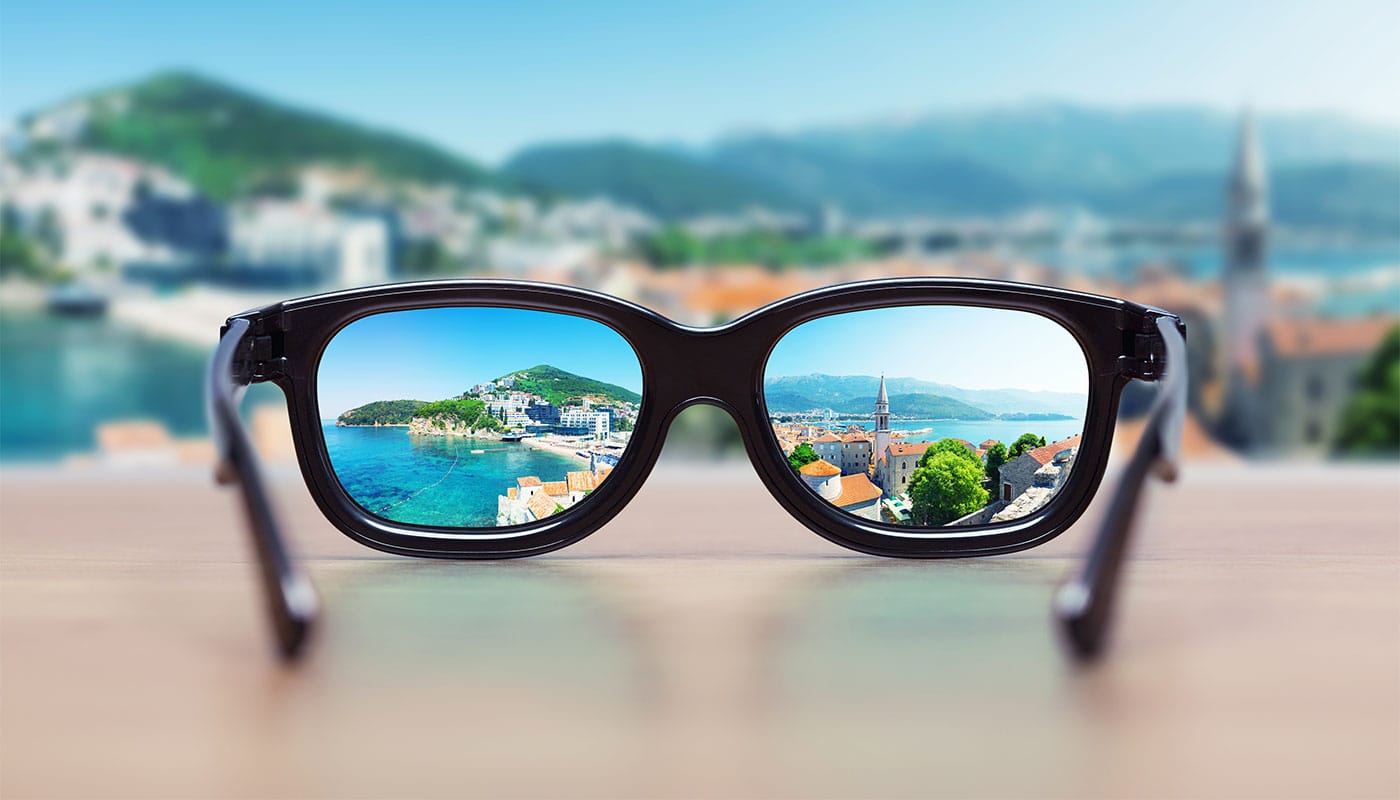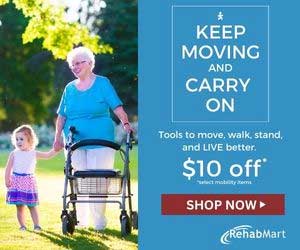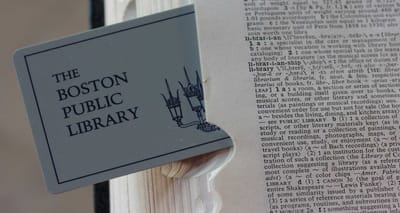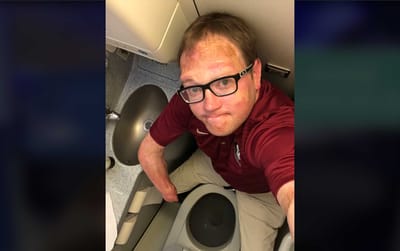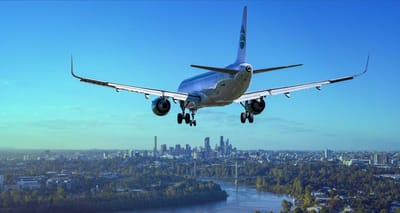At a conference some weeks ago, I was asked to explain my purpose for creating WheelchairTravel.org. Not wanting to get bogged down in the details, I simply said that I endeavor to “provide clarity” to people with disabilities who are interested in traveling.
I later recounted that response, thought through it a bit more, and realized that clarity is the most important thing in accessible travel. And it’s something that is sorely lacking.
The many facets of clarity
If I asked people to list products that improve clarity, most would say eyeglasses. That’s not surprising, since nearly two-thirds of Americans wear prescription eyeglasses to solve problems with sight. Corrective lenses allow us to overcome visual impairments and see the world with greater clarity.
But for the one-third of Americans who don’t wear glasses, who achieve clarity in other ways, things like flashlights, high-definition televisions or perhaps even noise-canceling headphones might come up. But these things—spectacles included—are just the tip of the iceberg.
Our minds seek clarity through knowledge, answers to questions and factual information. That’s why the top 5 websites on the internet, from Google to Wikipedia, connect people with information. My sister even mentioned that our relationships with people bring us clarity. It is no surprise, then, that Facebook is the 3rd most visited internet website.
We’re addicted to clarity. It’s why we wash our windows, go to church, meditate, listen to TED talks, ask questions, read books and watch presidential debates.
And as people have sought greater clarity, the market has reacted with scores of new products and services to accommodate those desires. But people with disabilities also participate in the marketplace, and we have a right to demand high-definition clarity on accessibility. The travel industry isn’t responding to those demands, which is why websites like this one exist.
Clarity in advertising and marketing
How would you feel if you were sold a flat screen high definition television, but opened the box to find it was actually a standard definition CRT TV a la the 1990s?
That type of false advertising is happening every day in the hotel industry, but it relates to ADA accessible hotel rooms.
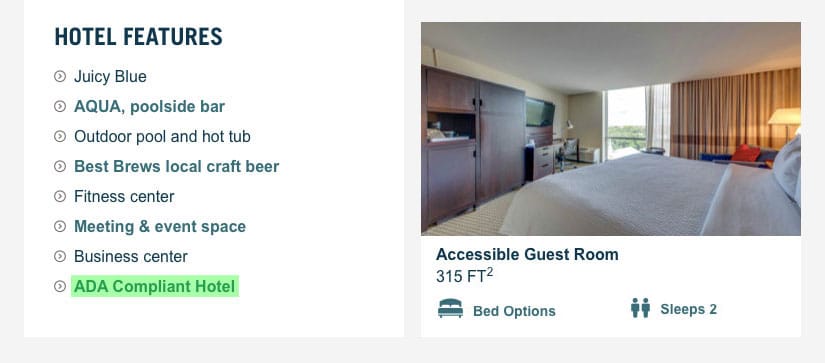
The screenshot above was taken from the website of a hotel that I have previously stayed at. Under hotel features, it advertises “ADA Compliant Hotel” (highlighted in green for your reference). In seeing this written on the website, travelers would expect the accessible guest rooms to comply with the ADA Standards for Accessible Design, and they would also expect the hotel shuttle to be wheelchair accessible. Unfortunately, neither of those assumptions would be true.
Because I placed trust in the website and did not call to verify, I ended up in a hotel room with a non-compliant bathtub which I could not use—on a sold-out college football game weekend. The consequence of that false advertising was significant. I couldn’t shower, and there were no alternate accommodations available.
The phrase “ADA Compliant” offers immense clarity, but its misuse truly victimizes. Businesses should provide accurate information on the nature of accessibility, clarifying any shortcomings that do exist (even if they violate the ADA).
Clarity in questions, answers and understanding
“Hello, can you tell me if your business is wheelchair accessible?”
Unless you are certain the person you are talking to knows what wheelchair accessible actually means, you’ll need to be much more specific.
“Hello, are your hotel rooms ADA compliant and wheelchair accessible?”
Do you fully understand the ADA? Do you expect the reservations agent to know what the ADA requires of hotels? 99.9% of the time, that agent (or his/her supervisor) will say yes, even if it is not true.
When posing questions about accessibility, pursue clarity! Be specific. Ask for measurements. Request a photograph, if necessary. Doing so will help you (the customer) avoid an unwelcome surprise, and it will also help the business to answer honestly, without making assumptions or determinations based on their imperfect understanding of the ADA and accessibility.
Clarity in expression (of individual needs, expectations and consent)
When I first began traveling with a disability, I was shy. I didn’t want to appear a burden, and I wasn’t inclined to rock the boat. Time after time, I simply accepted what was offered and failed to fully express my needs. This was a mistake, but I finally learned to pursue clarity and to set expectations. It wasn’t easy and at first it made me uncomfortable, but finding your voice is critical to having a safe and enjoyable trip.
Let’s use wheelchair assistance at the airport as an example. If you use a wheelchair and cannot stand or walk, like me, you’ll need help onto the airplane. If you need assistance in transferring from your wheelchair to the boarding chair, or from the aisle wheelchair to your seat, you should provide clear instructions on how the assistance team should lift you. And, the people providing that assistance should listen to your instructions and wait for permission before touching you.
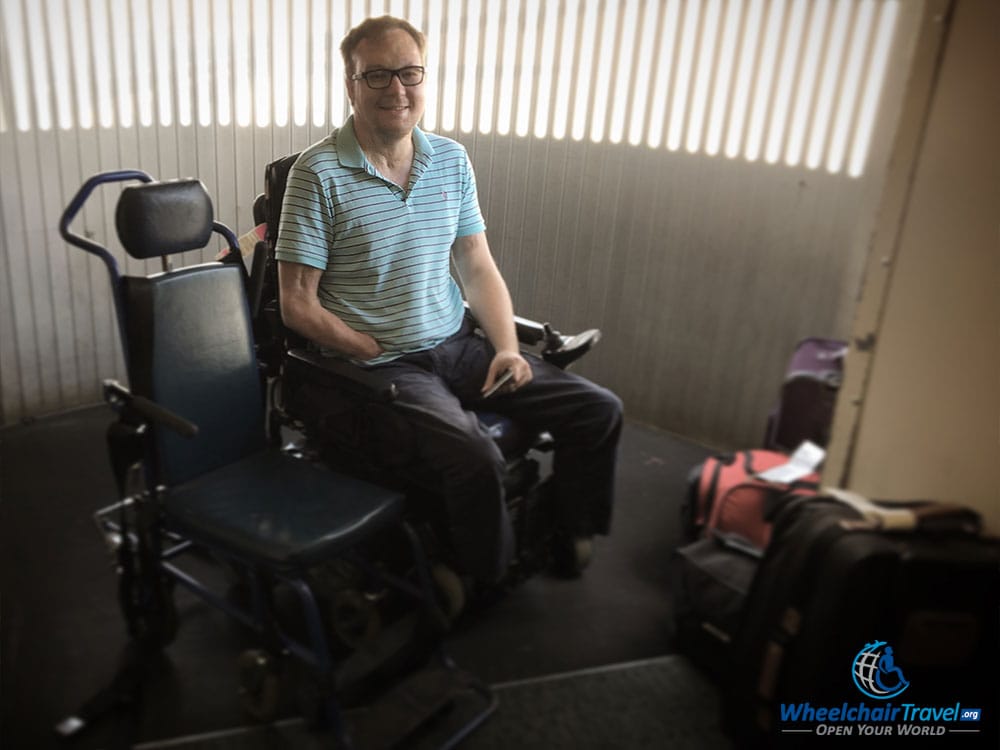
A lack of clarity in your instructions or a failure to speak up when something is not done correctly could result in discomfort or injury, both of which are unacceptable. The same consequences are possible when staff fail to adhere to your instructions or act before receiving them (and without your consent).
Have you ever ridden the city bus or in a taxi cab, and realized that the driver hadn’t secured your wheelchair properly? I hope you spoke up, as your safety was at stake. Have you ever checked-in to a hotel, only to discover it was not compliant? I hope you spoke up, because your rights to accessibility matter. Don’t want an onion on your cheeseburger? Order it without.
There is no shame in clarity. There is no shame in having needs that must be accommodated. And, there is no shame in educating people or businesses in customer expectations or in ADA compliance. When we settle, we sacrifice our rights and in many cases accept unnecessary risk.
The benefits of clarity in accessible travel
Happy customers! Isn’t the goal of every business to serve its clientele? Wouldn’t businesses rather have customers who are satisfied, as opposed to the alternative? Is positive PR better for business than negative PR? Is more business (and more satisfied customers) better than less?
Making clear statements outlining the accessibility of a business or service that can be easily understood by potential customers with disabilities is a win-win for everyone.
Detailed explanations and photographs of accessible features, including wheelchair ramps, ADA bathrooms, handicap parking, etc. will allow people with disabilities to make educated decisions about where they spend their money.
Any barriers to access, such as narrow doors, steps, steep ramps, small bathrooms, etc. should be clearly outlined. Providing this type of information protects businesses from upsetting those who assume a certain level of accessibility, but might otherwise end up disappointed. Take out the necessity for assumption!
Businesses should strive for absolute clarity when describing the nature of accessibility. Generalized statements that lack detail are not acceptable in 2018. And, citing ADA compliance where it does not exist should be a crime in itself (it could be, actually).
Clarity can be achieved, if we work together
Why do the majority of relationships fail? The top result on Google was a blog post from Psychology Today, which listed trust issues and a lack of communication as reasons for America’s staggering divorce rate.
A lack of trust and communication? Those are the same reasons why people with disabilities are so often disappointed with their travel experiences. The hotel in Tallahassee that falsely advertised ADA compliance lost my trust. People get hurt when communication breaks down. When things go wrong and our expectations are not met, no one is happy.
A commitment to clarity has the power to make accessible travel more accessible by improving our experiences as people with disabilities who travel. Clarity in advertisement, consent, instruction, expectation, communication and understanding are critical to success for businesses and travelers alike. Let’s work together to achieve that, in our own personal relationships and in the ones we form as customers and as businesspeople. In many ways, clarity is the greatest form of respect we can offer one another.

